
2022 ANNUAL REPORT ReadCharlotte.org
Read Charlotte is a community initiative that unites educators, community partners, and families to improve children’s reading from birth to third grade. We support local partners to apply evidence-based knowledge about effective reading instruction and interventions, high-quality execution, continuous improvement, and data analysis to improve reading outcomes.
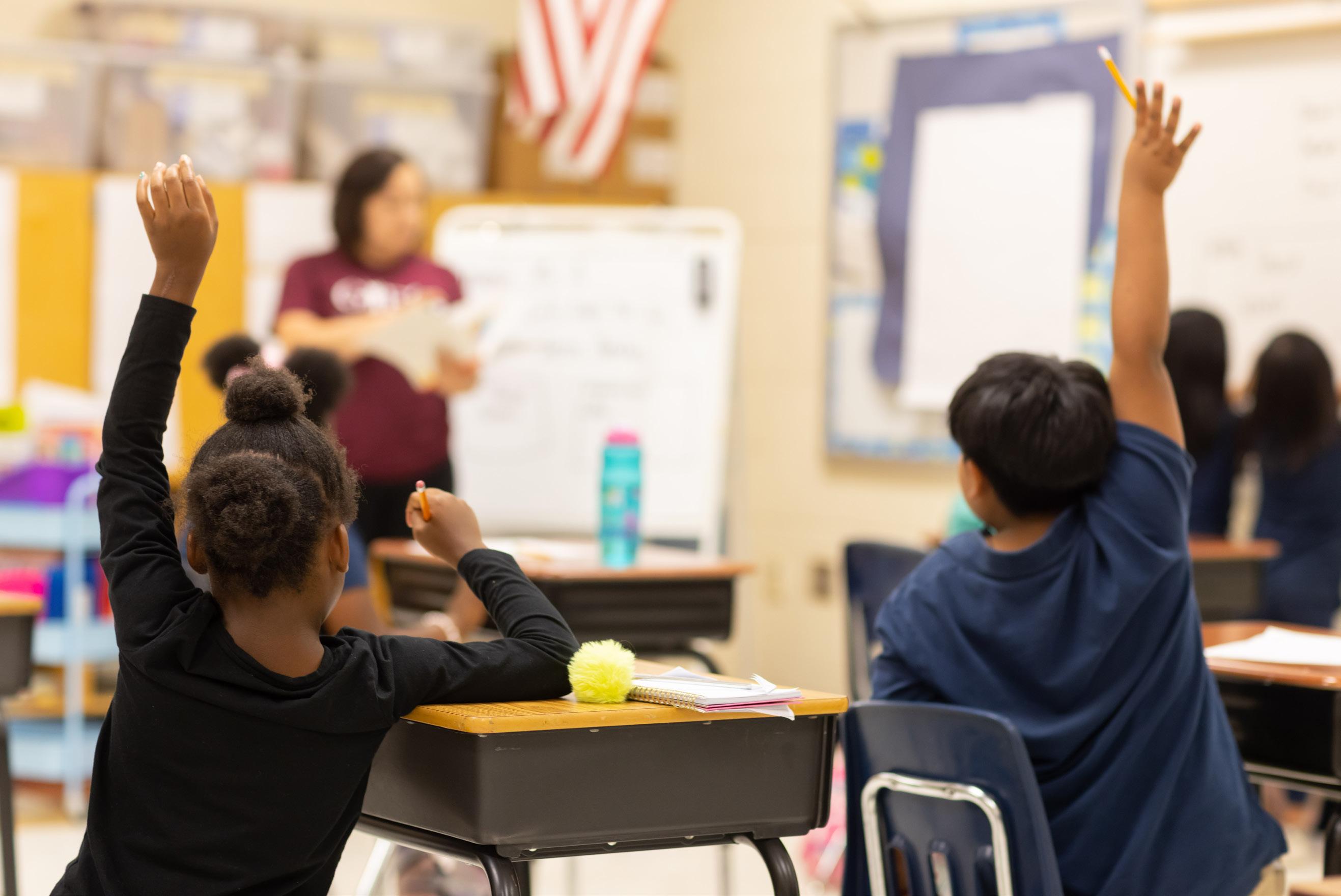
1
Working together, we can improve reading proficiency and put our children on a path for success and opportunity.
ReadCharlotte.org
Dear Friends,
The past year was incredibly challenging as the negative impact of the pandemic on early literacy became even clearer. Far too many elementary school children were behind in reading as we experienced historically low literacy rates on state reading assessments. But these challenges were not unique to CharlotteMecklenburg. At the national level, the disruption of regular classroom instruction wiped out two decades of student growth in early reading and math. The challenges we experienced in Mecklenburg County were replicated across many of the other 99 counties in the state of North Carolina.
Our community’s response to these challenges, however, was exceptional. Charlotte-Mecklenburg Schools juggled shortages of bus drivers, teachers, and other key roles to keep our schools running each day. The Charlotte Executive Leadership Council partnered with CMS, resulting in a deeper relationship between the school system and business community. Countless nonprofits, houses of worship, and philanthropic donors wrapped their arms around students, families, schools, and neighborhoods to provide a range of needed academic and non-academic supports.
Throughout all of this, Read Charlotte remained laser focused on helping our community get early literacy back on track. We developed new partnerships and deepened existing relationships. We supported expansion of tutoring; provided tools for partners to empower families to support literacy at home; partnered with CMS and MECK Pre-K on new classroom pilots; provided training, coaching, and resources to after school programs; and, helped a new effort to expand summer learning for Title 1 schools get off the ground. Despite the challenges our community has faced over the past several years, we are more confident than ever of our community’s ability to transform early literacy outcomes if we work together.
Read Charlotte Board Chair
Read Charlotte Executive Director

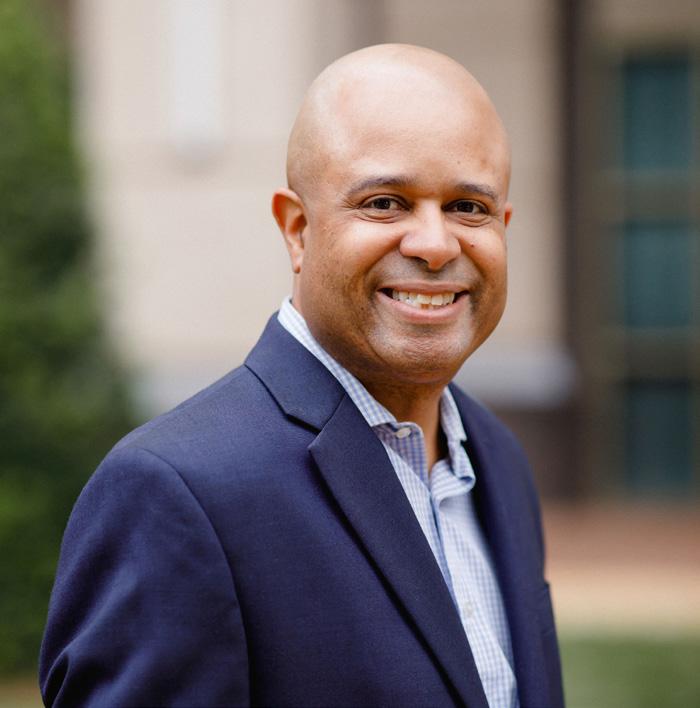
Annual Report | 2022
MUNRO RICHARDSON
CRAWFORD POUNDS
2
The state of early literacy: Impact of the pandemic
The pandemic created unprecedented challenges for schools, educators, families, and students. The National Assessment of Educational Progress revealed that two decades of growth for American elementary students in reading and math were wiped away by just two years of pandemic-disrupted learning. In 2022, we received our second year of pandemic-era state reading scores for third grade students in Charlotte-Mecklenburg Schools. While we saw some local green shoots of recovery, there is much work for all of us to do together to build back towards our community goal of at least 80% of third graders reading at College and Career Ready levels.
ZOOM in:
1 2 3
The Charlotte-Mecklenburg Schools students who took the Grade 3 End-Of-Grade (EOG) tests in spring 2022 were in first grade at the outbreak of the pandemic. They experienced at least six quarters of less-than-normal classroom instruction.
There are green shoots for an early literacy recovery. There was a 3.7 percentage point increase in third grade students scoring at Grade Level Proficient in reading from 2021 to 2022 (though that number is still 14 percentage points below 2019). This is an early indicator of momentum for recovery. Improvements occurred for students across racial and socioeconomic groups.
Our community goal continues to be for our students to be College and Career Ready. There was a 4.4 percentage point drop in
4 5
third grade students at College and Career Ready in reading from 2021 to 2022. This continued decline (21 percentage points below 2019) occurred across racial and socioeconomic groups.
Charlotte-Mecklenburg Schools’ Grade 3 reading results are in line with the other nine largest public school districts in North Carolina. They also align with national results for reading for age 9 students recently released by the U.S. Department of Education.
More schools than ever have very low levels of Grade 3 reading achievement compared to before the pandemic. The situation is especially concerning for our Title 1 schools. These schools need our help and need our community to work together like never before.
3
“
5Five key takeaways in Mecklenburg County
ZOOM out: North Carolina trends
Our local results can be better understood in the context of statewide efforts to recover from the impact of the pandemic, keeping in mind there is no exact peer for CMS’ size and poverty level. For our review, we compared results for CMS with the nine other largest public school districts in North Carolina. There are two key takeaways:
The 3.7 percentage point increase in CMS third grade students at Grade Level Proficient from 2021 to 2022 is greater than the average increase (2.2 percentage points) in the other nine largest districts in North Carolina. Cumberland County Schools experienced the greatest increase of 6.4 percentage points.
The 4.4 percentage point decline in CMS third grade students at College and Career Ready from 2021 to 2022 is less than the average decline (5.5 percentage points) in the other nine largest districts in North Carolina. Wake County Public Schools experienced the largest decline of 10.2 percentage points.

Both the state and CMS saw significant gains in K-1 reading in the 2021-2022 school year. These gains provide additional hope that we are beginning to curb the effects of the pandemic on early literacy.
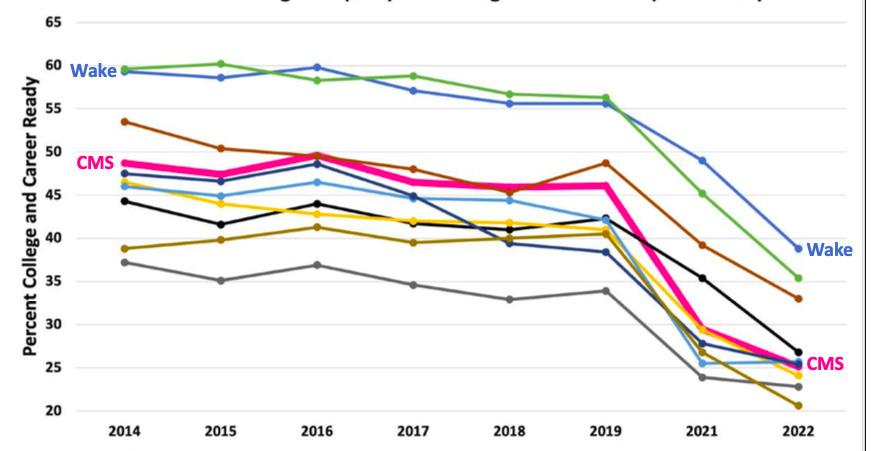
4
Third Grade Reading EOG CCR in Ten Largest NC Districts (2014-2022)
“ Two decades of growth for American students in reading and math were wiped away by just two years of pandemicdisrupted learning.”
–The 74, a nonprofit, educationfocused news organization
1 2
CMS Third Grade Reading EOG CCR, Four Racial Subgroups (2014-2022)
Helping children recover from the significant impact the pandemic had on their learning will take the work of our whole community. Read Charlotte believes this work is possible and necessary. In the pages ahead, we’ll highlight the promising efforts happening within our organization, with our partners, and throughout our community.
Wake CMS Guilford Forsyth Cumberland Union Johnston Cabarrus Durham Gaston
White Asian Black Hispanic
The path forward

ReadCharlotte.org
5
Each of these interacts with the others to help children understand and evaluate written text. Weakness in any of these can prevent a child from reaching their full potential. Focusing on the development of these skills in the areas of classroom instruction, tutoring, summer learning, and family empowerment can help children become strong readers.
We are not alone in this work. Our community believes that children deserve the very best that we can give them. There’s promising work being done to improve early literacy in Charlotte-Mecklenburg at multiple levels both within Read Charlotte through its direct partnerships, and across the broader community.
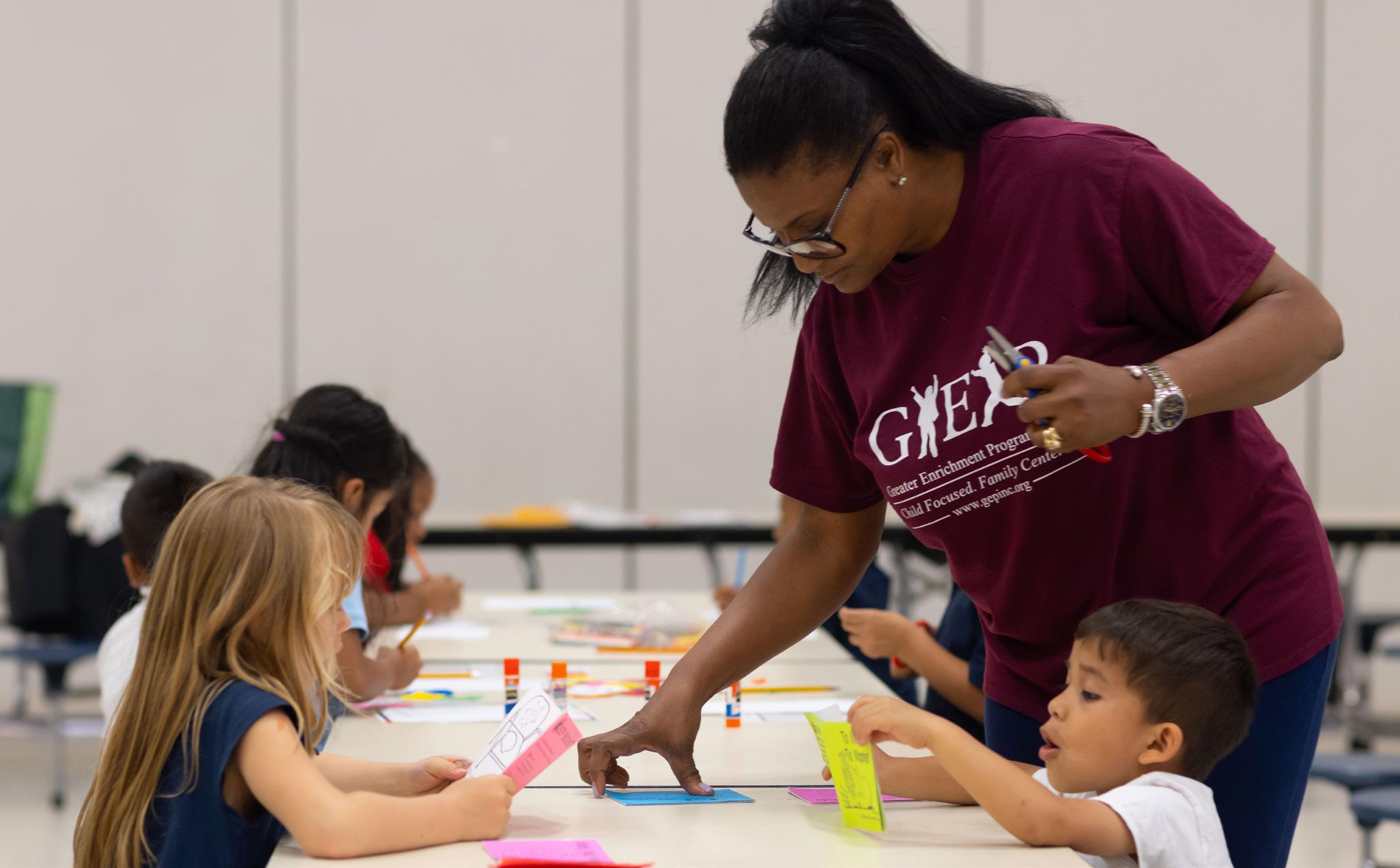
6
ORAL LANGUAGE (vocabulary and grammar) LISTENING COMPREHENSION WORLD KNOWLEDGE PHONICS, DECODING,
Findings from “Reaping the Rewards of the Reading for Understanding Initiative,” published in 2020
The most recent reading research finds there are four key ingredients that are critical to helping all children develop strong reading comprehension skills by third grade.
AND WORD RECOGNITION
OUR WORK WITH PARTNERS
classroom instruction, tutoring, summer, and family empowerment.
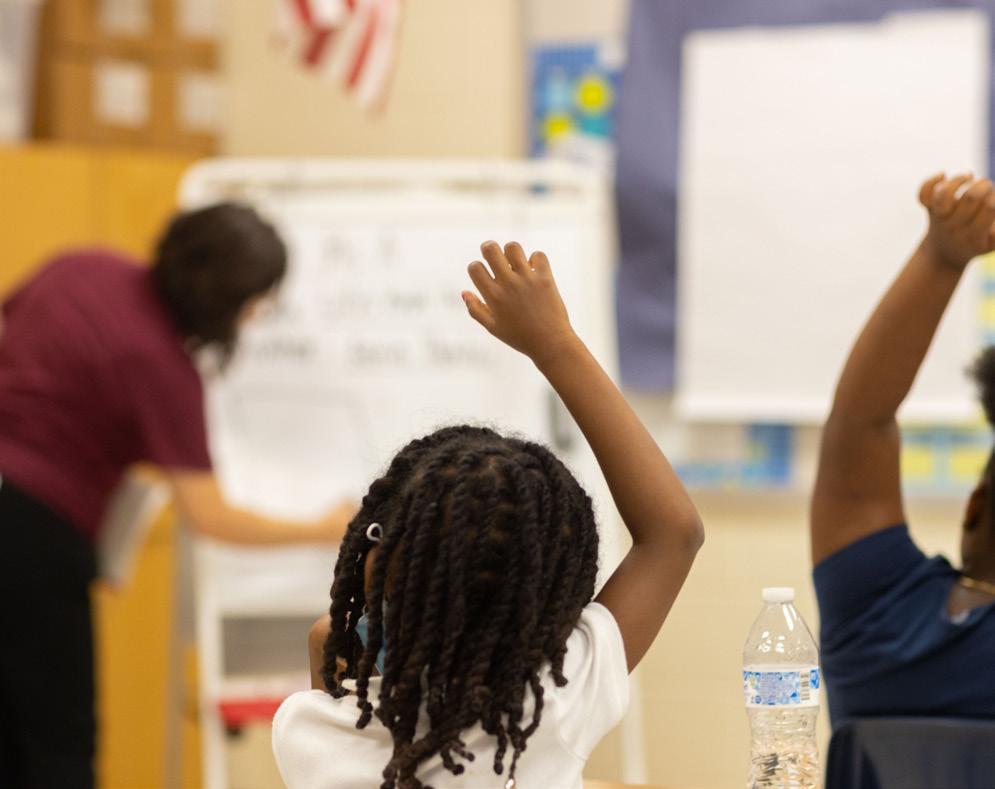

2022 HIGHLIGHTS
CLASSROOM INSTRUCTION
• CMS is piloting A2i, a platform to help PreK-3rd grade teachers effectively individualize reading instruction, in six elementary schools this school year. A2i combines quick, adaptive assessments of word reading, vocabulary, and comprehension with evidence-based algorithms, providing recommendations for how to use classroom time with existing curricular materials for each child. Read Charlotte has tracked the research behind A2i since 2017, and consider it one of the most promising, high-impact solutions we’ve seen with strong evidence of improving outcomes.
• Read Charlotte is also working with MECK Pre-K and Smart Start of Mecklenburg County to pilot the use of the A2i Pre-K platform this school year in 10 MECK Pre-K classrooms. The pilot’s focus is to explore how the A2i platform can assist and enhance Pre-K teachers’ and coaches’ use of existing curricular materials to individualize reading instruction and meet a range of Pre-K student needs. The goal is to increase the number of children who finish Pre-K ready to learn to read when they enter kindergarten.
Good work is happening every day across Charlotte-Mecklenburg to support early literacy. Here, we highlight some of our work with partners in 2022, in the focus areas of
7
TUTORING
• Read Charlotte continued its work with A2i After School in 2022, after working with Learning Ovations, the company behind A2i, to bring an adapted after school version of the system to Mecklenburg County in 2021. In the time since, we’ve developed training, resources, and data systems to support local community groups to use A2i After School for highimpact tutoring within existing after school programs. So far, the program has served 742 students.
• In 2022, Read Charlotte worked with eight out-ofschool groups to help support their reading programs. We provided more than 50 coaching sessions, as well as in-person and virtual training that reached more than 150 adults. In the summer, we began conducting in-person observations that gave us incredible insight into the work our partners do on a daily basis.
• Providing more high-quality tutoring for students has been a major focus area for our community this school year, coming out of the pandemic. Read Charlotte partnered with CMS and the Charlotte Executive Leadership Council to organize a workshop on strengthening the tutoring system in June, followed by a series of coordination meetings, called Tutoring Roundtable, that included the three districtendorsed in-school tutoring providers: Augustine Literacy Project - Charlotte, Heart Math Tutoring, and Helps Education Fund. One of the needs these meetings helped identify was for more volunteer tutor recruitment efforts. To meet that need, Read Charlotte created TutorCharlotte.org, a website to help source and funnel prospective volunteer tutors for the three tutoring organizations, and a marketing campaign to help drive traffic to the site. Going forward, we expect this roundtable will likely grow to include other expanded learning opportunities.
What’s to come
Read Charlotte is developing a new initiative, QC Readers, to help address the widespread need for literacy tutoring in our community. This school year, after two years of pandemic-related learning interruptions, Charlotte-Mecklenburg Schools has identified over 20,000 K-3 students as needing additional support.

The primary aim of QC Readers is to build rapid decoding skills that lead to automatic recognition of words that a typical student needs to know by the end of first grade. These expectations are aligned with the North Carolina English Language Arts standards for kindergarten and first grade.

The initiative, which we’re aiming to have ready for use in October 2023, is designed to be used by organizations like houses of worship, community-based organizations, and other community locations where adults regularly interact with young children. The materials are simple, easy-to-use, and accessible to any adult with a minimum high school education and no formal literacy training.
If you’re interested in learning more, email qcreaders@readcharlotte.org.

ReadCharlotte.org
8
OUR WORK WITH PARTNERS 2022 HIGHLIGHTS

• Read Charlotte’s work with A2i After School continued through summer of 2022, with four community partners using it to serve 713 students as part of their summer programming, in addition to during the school year. Continuing this work beyond the school year is part of our strategy to promote year-round tutoring.
SUMMER
• A group of summer learning providers (Above and Beyond Students, National Black Child Development Institute – Charlotte, Freedom School Partners, Greater Enrichment Program, International House, and the YMCA) worked together in 2022 to give more students access to summer programs in 2023. The Summer Access Fund initiative aims to add summer program access to 16 CMS Title 1 schools that currently do not have a summer learning partner.
• The Summer Literacy Infusion (SLI) program model, brought to Mecklenburg County by Read Charlotte and administered by the YMCA of Greater Charlotte, reached more than 2,800 children in summer of 2022. The model incorporates one hour a day of literacy into traditional summer camps to help stop summer learning loss, which is a key strategy to improving third grade reading outcomes. The YMCA has grown local use of SLI exponentially since Read Charlotte brought it to Mecklenburg County in 2017, expanding from serving around 200 children in its first summer to more than 2,800 children in summer of 2022. The model continues to show promising results: In 2022, 96 percent of campers at the Y and 97 percent of campers at outside organizations with pre- and post-tests maintained or improved their reading level.
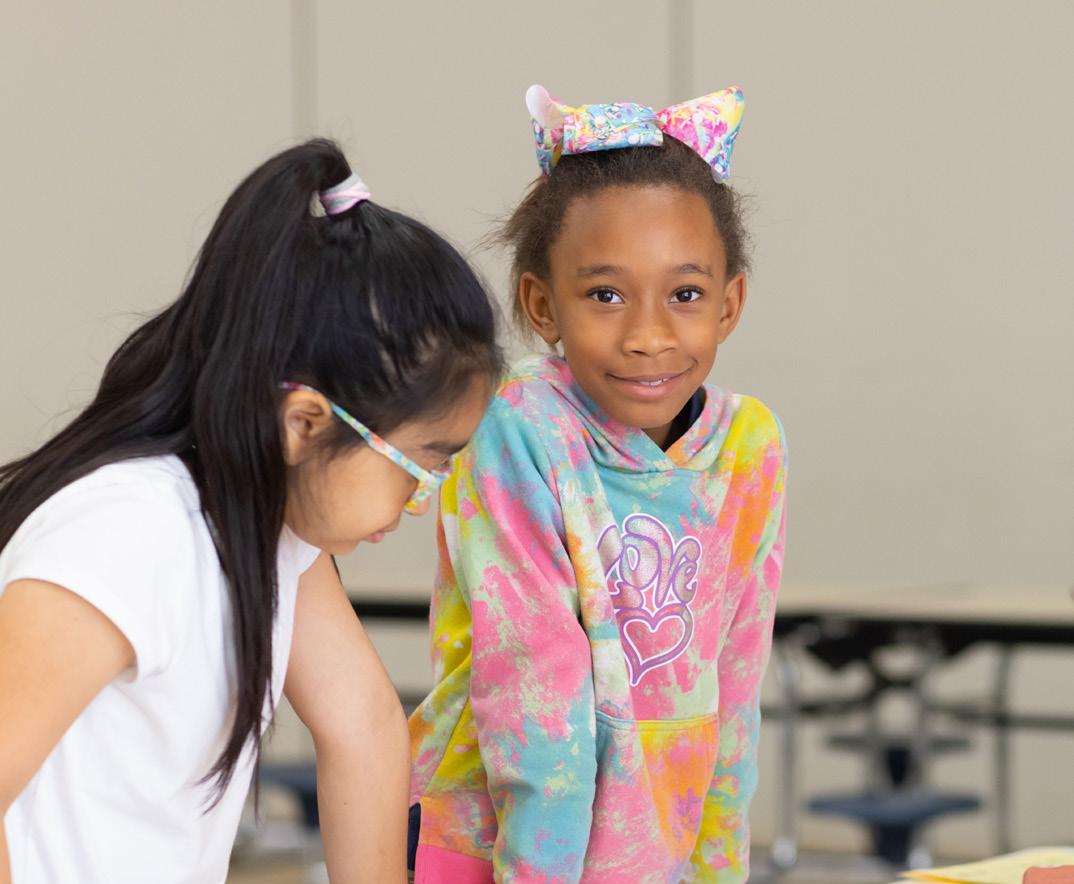

9
FAMILY EMPOWERMENT
• HomeReadingHelper.org, created by Read Charlotte in 2018 for parents and caregivers to use at home with PreK-3rd grade children, continued to serve as a children’s reading resource across the city, state, and country in 2022, with more than 136,000 people visiting the site.
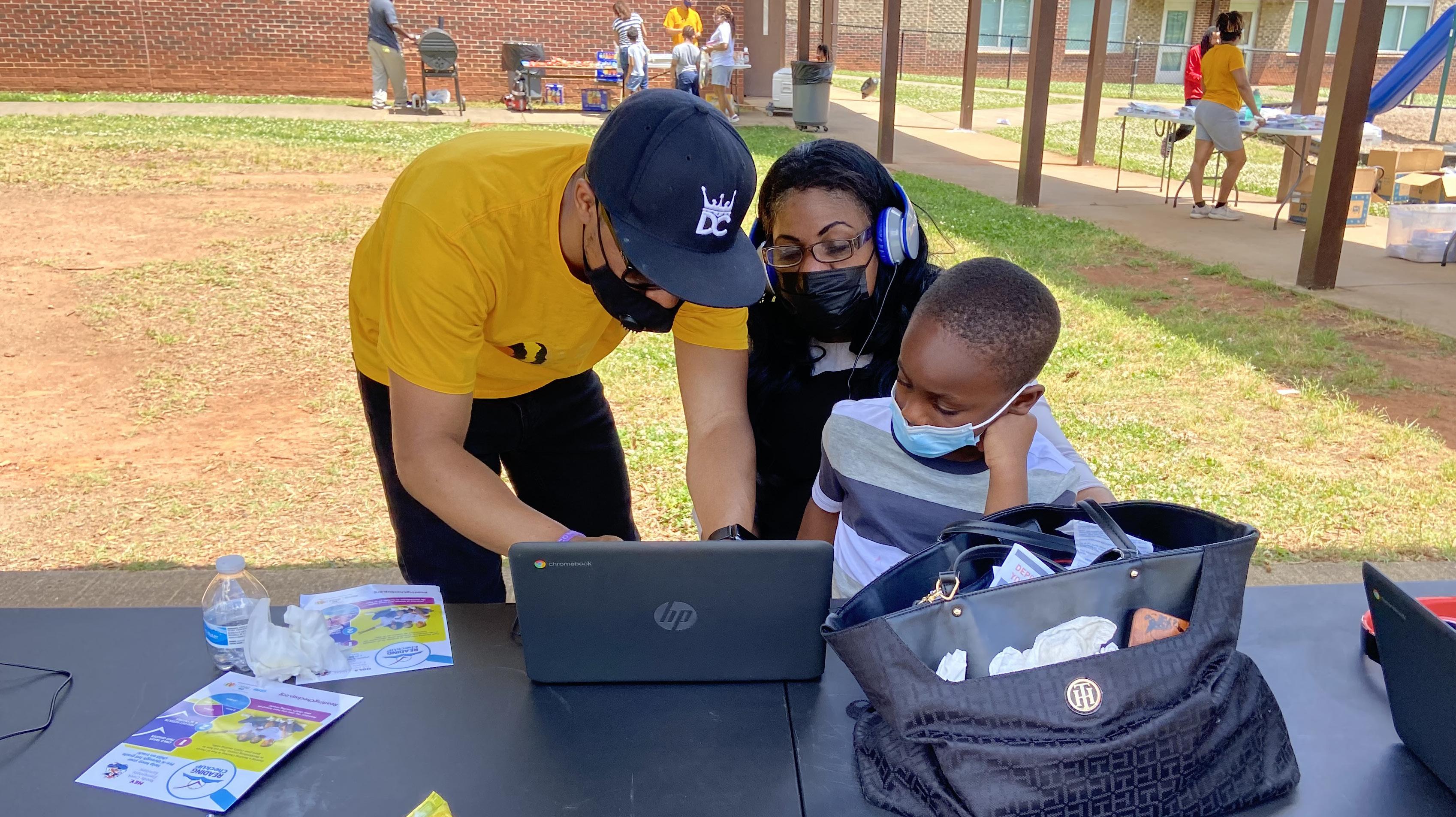
• Reach Out and Read NC has scaled up from serving about 22,400 children 0-5 in 2016 to now serving 35,607 children in Mecklenburg County, prioritizing low-income households. Over 200 local healthcare professionals have committed to embedding the Reach Out and Read intervention into the clinic culture and ultimately into the way they practice medicine for young children. Read Charlotte has partnered with the group since 2017 to expand the availability of its effective literacy program, in which medical providers encourage families to read books and build children’s language through well child visits.
• With the help of marketing efforts and direct service partners like Black Child Development Institute Charlotte, Mecklenburg County children continued to get Reading Checkups in 2022. Read Charlotte partnered with Learning Ovations to bring the online tool to Mecklenburg County in 2020, to provide free individual reading plans to families with PreK3rd grade children. More than 4,700 Checkups had been completed as of the end of 2022.
• Ready4K, a research-based text messaging program for parents with young children, reached 1,698 families in 2022. Read Charlotte introduced the program, which provides age-appropriate facts and activity ideas for early childhood development and literacy, to Mecklenburg County in 2017. In 2020, we partnered with Smart Start of Mecklenburg County on Ready4K, and Smart Start took the lead on the program and now directly manages it in our community.
10
WORK WITH PARTNERS
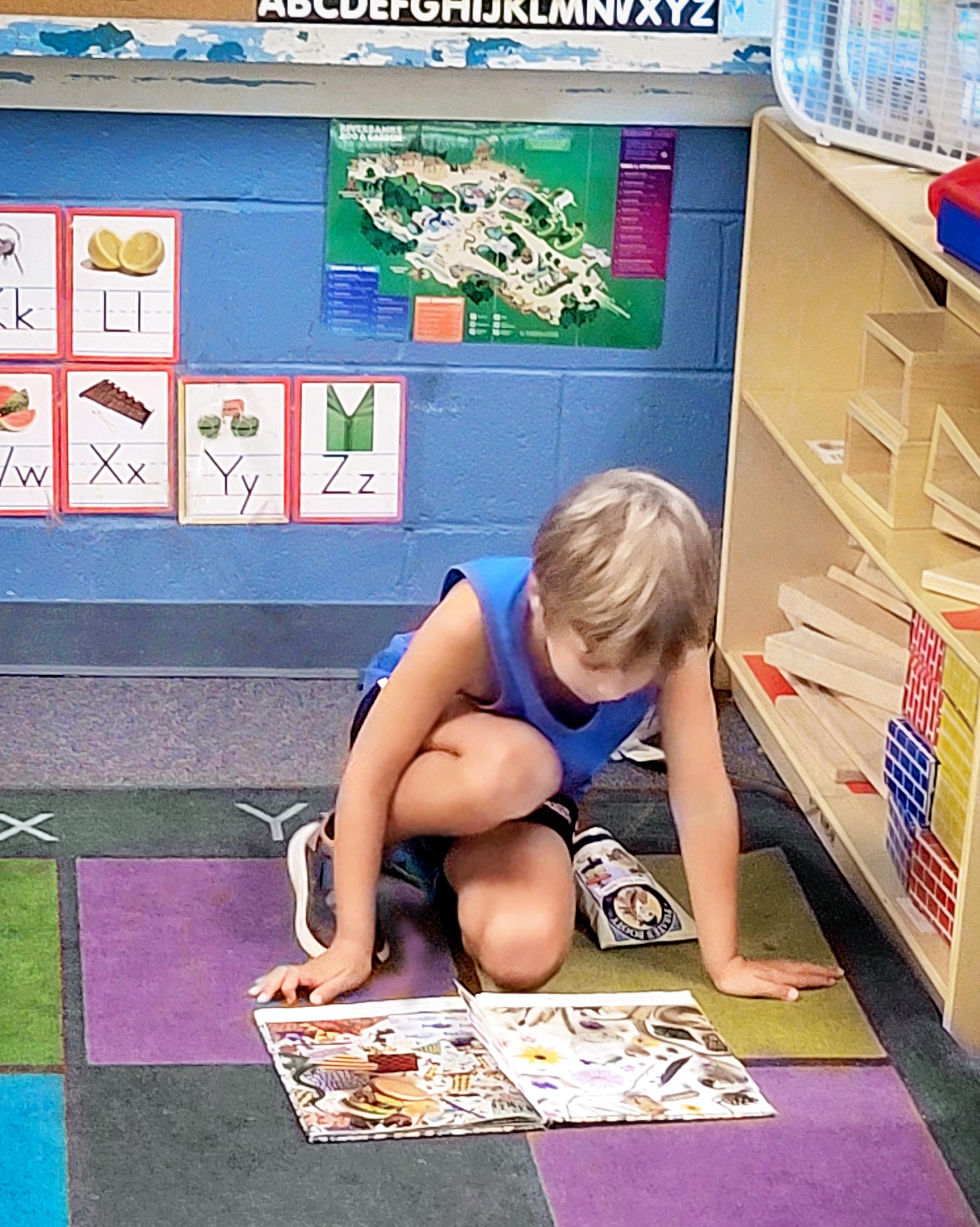
Partner spotlight:
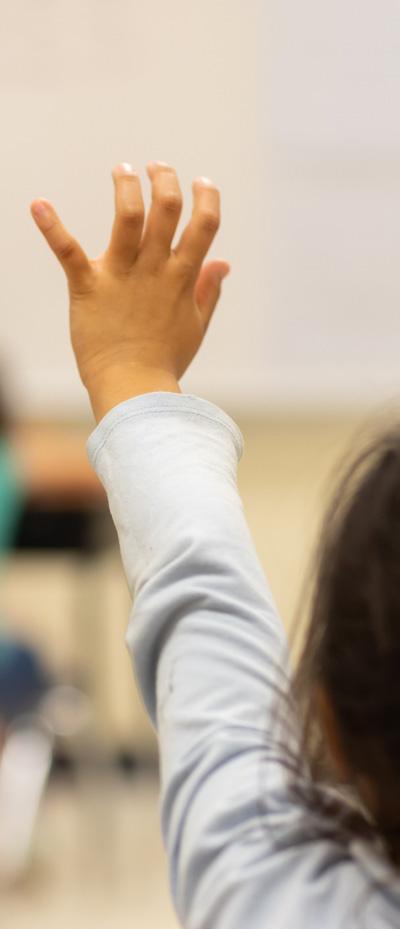
11
OUR
Summer Literacy Infusion becomes significant part of local summer learning landscape
In just a few years’ time, a model aimed at addressing summer learning loss has become a significant part of the local summer learning landscape, growing to reach thousands of students in the summer of 2022.
Read Charlotte first learned of the Summer Literacy Infusion (SLI) model in 2016 from partners in Philadelphia and saw potential to implement it locally. The premise of the model is simple but powerful: Add one hour a day of literacy to traditional summer camps.
We brought the model to our partners at the YMCA of Greater Charlotte, who agreed the potential was there.
“I think one of the really nice things about the SLI model is that it addresses a known gap,” said Amanda Wilkinson, association director of literacy and youth programs at the Y. “We have a large body of research that shows that kids can fall behind in the summer if they’re not practicing reading, and so it’s nice to have a solution to a known problem.”
The simplicity of the model and its existing framework meant it could be put to use quickly. Plans to implement SLI in Mecklenburg County began in early 2017, with Read Charlotte making a grant from its Transformation Fund to the Y to manage it. By that summer, the Y was piloting SLI at three sites, serving more than 200 kids. The results were encouraging: 73 percent of campers maintained or improved their reading level.
The number of camps using SLI quadrupled by 2018, with 12 sites serving 680 kids. The results that year were similarly promising. In 2019, the Y began using SLI in all its summer day camps, serving 1,071 kids. Eighty-five percent of campers maintained or improved their reading level.
The Y was ready to scale further in 2020, but the pandemic brought those plans to a halt. It also raised the stakes, spurring the Y to think about larger plans for 2021.
“It really challenged us to think more aggressively about what we needed to do moving forward coming out of the pandemic and the summer,” Wilkinson said. “If kids had been virtual learning for a year, well, we don’t really have the luxury of sitting back in the summer.”
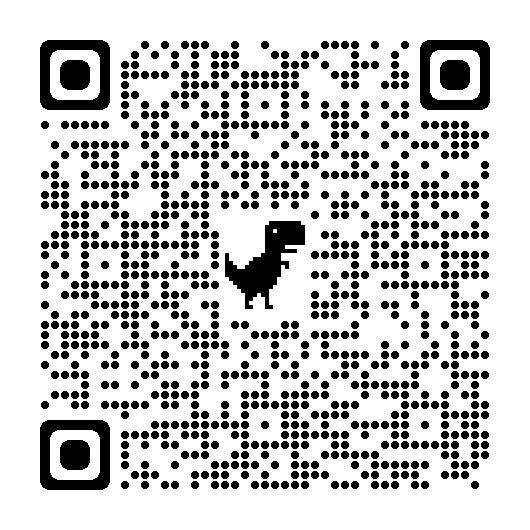
The Y had dabbled in supporting SLI implementation at other community organizations’ camps, but really took ownership of that role in 2021. Thirty-two camps from 14 organizations used SLI that summer, serving 2,394 kids, with 95 percent of campers at the Y and 94 percent of campers at outside organizations maintaining or improving their reading level.
In summer of 2022, 38 camps from 15 organizations used SLI, serving 2,828 kids. Ninety-six percent of campers at the Y and 97 percent of campers at outside organizations maintained or improved their reading level.
Moving forward, the Y hopes to see continued growth of SLI in our community.
“For anybody who works with kids, and anyone who works in the academic space, you say yes whenever you can say yes,” Wilkinson said. “Because every time we say yes, more campers get to participate and are impacted.”
There’s more to this story! Read the full blog here:
12 ReadCharlotte.org
ACROSS THE COMMUNITY
Our community continues to come together to improve early literacy. Here, we highlight a longtime partnership between a local school and church that has touched thousands of students’ lives. It’s one of many ways we see the broader community creating fundamental change in Charlotte-Mecklenburg.
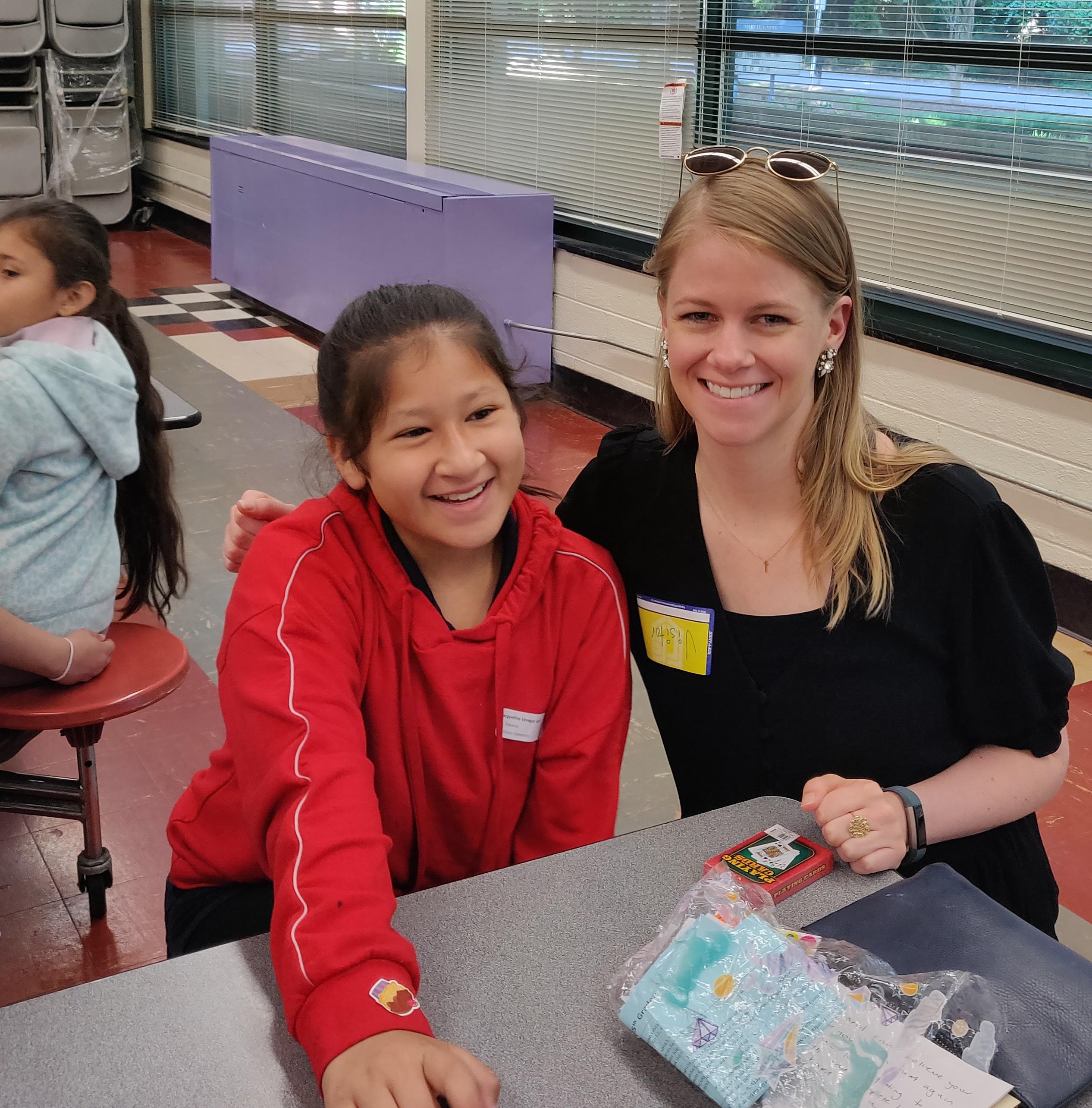
13
School, church create ‘flagship model’ of school-community partnership
The partnership between First Presbyterian Church of Charlotte and Westerly Hills Academy is a strong one, one that the school principal describes as a flagship model of a successful school-community relationship.
In 2000, the church staff reached out to CharlotteMecklenburg Schools and expressed interest in being partnered with an area school. CMS suggested Westerly Hills Academy, a Title 1 school with which the church had no prior connection. That suggestion sparked a partnership that has spanned 22 years and touched thousands of students’ lives.
Tutoring is a big part of how the church supports Westerly Hills, through its partnerships with Augustine Literacy Project, Heart Math Tutoring, and Helps Education Fund. Heather Herring, the church’s child and family partnership coordinator, promotes the three organizations to the congregation regularly, as well as the importance of and need for tutoring.
Herring said the church’s focus on one school has helped create close bonds.
“I think that we feel a real connection to Westerly Hills,” she said. “It’s 22 years of spending time together. I think by focusing your attention on one place and supporting it well, and supporting it consistently, that just makes it more powerful, and a more impactful experience.”
Westerly Hills Principal Kiesha Pride said building that connection took time and effort on both sides of the partnership, but that the commitment has been there since the beginning.
“They took the time to be in the building, to learn, to get to know the parents, to get to know the scholars. They know our staff members,” Pride said.
“To have that level of commitment – you don’t always find that. But I truly think that’s part of what has built the sustainability with this partnership.”
While tutoring is a central part of the partnership, it’s far from the only component. The church also has two summer camp programs, a food pantry at Westerly Hills, and organizes a range of staff appreciation efforts. For the church, the best measure of the partnership’s success is defined by the school.
“If the school achieves its goals, I feel like we’ve been successful in supporting them, whether that be staff morale, retention, academic scores, or parent engagement,” Herring said.
Westerly Hills saw academic progress last school year. Compared to 2021, the school went up in the percentage of third graders at Grade-Level Proficient by 10.3 percentage points, outpacing the district’s average gain of 3.7 percentage points. Westerly Hills also held its own on the more demanding College and Career Ready standard, increasing the percentage of third graders at College and Career Ready by 2.2 percentage points in a year in which 70 percent of schools experienced continued decline on this measure.
Pride said she would love for their story to help inspire other school-community partnerships. Looking to the future, she hopes to see the partnership with First Presbyterian continue just as it is.
“How do you go beyond what is already amazing?” she said.
There’s more to this story! Read the full blog here:
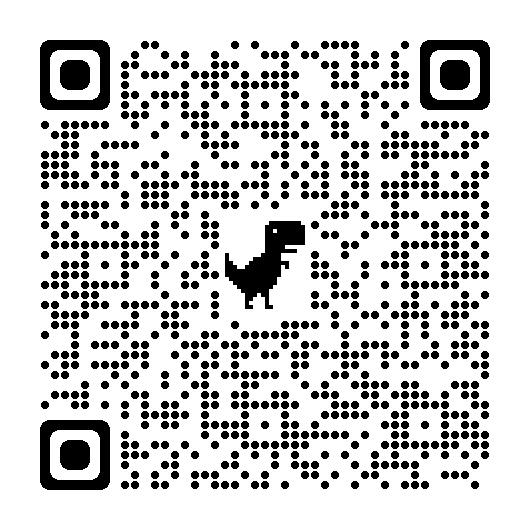
ReadCharlotte.org
14
Why continued investment in early literacy matters

A recent Read Charlotte-commissioned study by researchers at UNC Chapel Hill examined the relationship between early literacy and a range of later social outcomes. Researchers used a national dataset to find that early literacy provides protective factors across a range of social outcomes in the teens and early twenties. Improving early literacy – even controlling for individual and family differences – increases outcomes for college application, college graduation, household income, and employment. In short, getting children to reading proficiency in elementary school is a “super strategy” for increasing economic and social mobility and their chances for a happy and healthy life.
This study was underwritten by a grant from The Duke Endowment.
15
KEY FINDINGS 6
Compared to their peers with above average reading ability, students who have below average reading ability in Grades 3 and 4:
Have 25% less household income in their early-to-mid twenties.
Are almost two times as likely to not attend college.
Are almost 50% more likely to experience unemployment in their early-to-mid twenties.
Are more than two times as likely to not apply to college.
Are one-third more likely to report feeling depressed in their early-to-mid twenties.
Are 25% more likely to report substance abuse in their early-to-mid twenties.
We think the difference in above average and below average reading ability in these data loosely translates to the difference between College and Career Ready and Not Proficient on state reading tests.
Data are from the National Longitudinal Survey of Youth 1979 - it includes data from 11,545 children born between 1970 and 2006 to women in the original NLSY79 sample. Data were collected through surveys conducted every 2 years from 1996 to 2016. Literacy was measured before Kindergarten and in late elementary (3rd and 4th grade) and outcomes were measured in teens and 20s. The analysis controlled for differences in individual and family background, including sex, race, birth order, family income, books in the home, etc.
ReadCharlotte.org
16
Governing Board
Brian Collier
Foundation For The Carolinas
Dena Diorio
Mecklenburg County
Paul Draovitch
Duke Energy Foundation


Rebeca Fernandez
Davidson College
Fannie Flono
Community Volunteer
Sandra Holub
Albemarle Foundation
Rhett Mabry
The Duke Endowment
John Martin
Young Black Leadership Alliance
Katie Morris
The Belk Foundation
Anna Nelson
CD Spangler Foundation
Crawford Pounds
PricewaterhouseCoopers LLP (Chair)
Ben Pysch
PNC BANK
Justin Steinschriber
The Leon Levine Foundation
Jennifer Ward
Bank of America

Stick Williams
Community Volunteer
Earnest Winston/Hugh Hattabaugh
Charlotte-Mecklenburg Schools
Lead Funders

17
Additional Funders in 2022
Allen Tate Company
Alyssa Franklin
Amanda Beacham
Andrew Chambers
Angie Lanning
Ann Dunlap Hendrix Charitable Fund
Anna L. Reed
Anonymous (2)
Ashley Hardy
Atrium Health
Brian T. Elliott
Catherine Renzaglia
Charles F. Bowman
Cheryl Barton
Cheryl Green
Christine Caywood
Coaching for Literacy
Courtney Sica
Crane Family Foundation
David Tepper Charitable Foundation
Elevation Church
Elizabeth Daley
Gareth Green
Graham Wyllie
Hal and Holly Levinson Family Fund
Henry W. Sale
The Hobbs Foundation
Ismenia Lloyd
Jacquelin Bryant
James Family Foundation
James H. Nichols
Jennifer M. Wolfe
Jennifer Ward
Jodi Daprano
John D. Conley
Justin Brigham
Katherine Hunter
Kevin Hartwick
Michele Gamble
Mike Daley
Mike Maltarich
Morris Lane
Morton Family Fund
Nathan Berton
Peter Bowman
Randi Palmere
Rhett H. Mabry
Scott C. Anderson
Sharon Cogdill
Springsteen Foundation
Stephen L. Cornwell Foundation
Tate Family Fund
United Way Cato Endowment for Education Training Fund
Weston and Marty Andress
Winer Family Foundation
18
220 N.Tryon Street, Charlotte, NC 28202 ReadCharlotte.org
Report designed by Courtney Helton Creative LLC


























